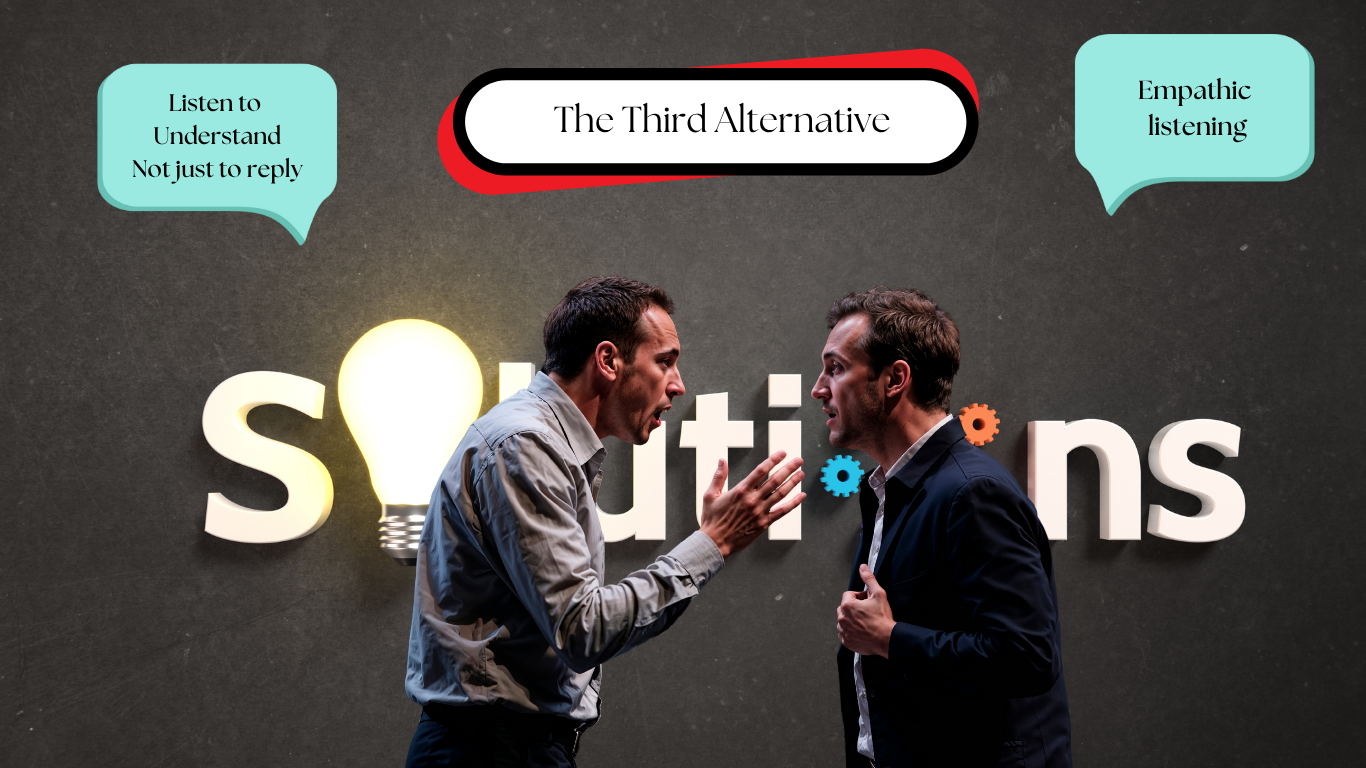In our increasingly divided world, we often get stuck in a loop of either-or thinking. It’s your way or mine, your beliefs or mine, your win or loss. This leads to conflict, compromise, and ongoing dissatisfaction. But what if we could break this pattern? What if instead of settling, we worked together to find a better solution for everyone involved?
Stephen R. Covey, in his book The 7 Habits of Highly Effective People, popularised the Third Alternative—an approach that encourages a shift from competition to collaboration, from conflict to creativity. The Third Alternative is more than just a compromise; it’s an entirely new solution that transcends the limitations of opposing sides. It combines your way and my way into a better way.
Table of Contents
Escaping the Trap of Binary Thinking
Most conflicts follow a predictable pattern. One side proposes a solution. The other disagrees and counters with a different proposal. Neither side wants to yield, and so they settle for a compromise—a deal where both sides give up something. It may seem fair, but compromise usually leads to mutual dissatisfaction. In the end, everyone walks away with less than they wanted.
This either-or mindset is inherently limiting. It assumes there’s not enough to go around, that we must choose between fixed and opposing outcomes. But life is rarely so rigid. The truth is, most situations offer far more possibilities than we initially believe—including The Third Alternative.
What Is The Third Alternative?
The Third Alternative is a creative approach to problem-solving. It provides a new solution that neither side would have thought of alone. Rather than lowering expectations, it elevates them. It’s not about meeting halfway; it’s about moving higher.
Imagine a triangle. The bottom two corners represent your idea and mine. The top point represents The Third Alternative—a better outcome that integrates the strengths of both views.
This approach is not just theoretical—it has the power to transform relationships, teams, and communities.
Also read: Life Changing Lessons from The 7 Habits of Highly Effective People”
Empathy: The Key to Unlocking The Third Alternative
Discovering the Third Alternative requires more than logic—it requires empathy. We must listen to what someone says and what they feel, fear, and value. We need to seek fundamental understanding.
Empathic listening doesn’t mean agreement. It means setting aside assumptions long enough to see the world through someone else’s eyes. It isn’t easy, but it’s also transformative. When people feel understood, they become more open—and this is where collaborative magic begins.
From Opposition to Collaboration
When empathy creates understanding, we can start to work together. Instead of competing, both sides can focus on solving the problem together. This change from opponents to partners is essential.
When people work together, they combine their creativity, knowledge, and goals. This teamwork greatly increases the number of possible solutions. Instead of having limited choices, they create many more. Together, they find solutions that neither could have imagined alone.
In families, workplaces, or even in international diplomacy, we often see that strong opposition can fade away when both sides focus on solving the problem instead of trying to defeat each other.
Celebrating Differences as Creative Fuel
Many people worry that differences create division. However, diversity is a strength. Having everyone the same does not bring unity; it leads to repetition. Two people with the same viewpoint aren’t likely to innovate. In contrast, people with different experiences and opinions can work together to create great ideas.
The Third Alternative values diversity. We open our minds when we accept that others may see things differently. Each unique viewpoint is like a piece of a larger puzzle.
Differences don’t divide us. Our refusal to value them does.
Humility: The Path to Growth
A key part of this process is humility. We need to understand that our view of the truth is limited. No one owns the entire reality, and what we observe is influenced by our biases and experiences.
Accepting this idea makes us more open to the chance that others may notice things we have overlooked. This openness helps us become wiser.
Seeing the world in black and white limits our options. We can learn more profound truths when we accept the grey areas and the full range of colours.
From Win-Lose to Win-Win-Win
The Third Alternative focuses on a win-win approach. It is not about choosing one person’s needs over another’s. Instead, it aims to find a solution that benefits everyone, creating a better result than adding individual parts.
This way of thinking assumes there is enough for everyone instead of thinking there isn’t enough. It believes that we can always find better outcomes with creativity and goodwill. This leads to better organisational innovation, stronger bonds in relationships, and real unity in communities.
How to Practice the Third Alternative Daily
- When faced with a conflict, pause. Ask yourself: “Is there a better solution neither of us has seen?”
- Listen with the intent to understand, not to reply.
- State your own needs clearly, but invite others to share theirs.
- Look for overlaps, then expand from there. Don’t settle; build something new.
- View disagreements as opportunities, not threats.
This takes time and practice. But the more you do it, the more naturally it comes, and the more powerful your conversations and relationships will become.
Don’t Settle for Compromise—Create Something Better
The Third Alternative is not just a communication technique—it’s a change in mindset. It represents a new way of viewing conflict. Instead of seeing it as something to fear, see it as an opportunity to create, connect, and rise higher.
The world needs more people who listen, understand, and work together. It doesn’t need more people who want to be right.
There is always a Third Alternative. The question is: Are you willing to find it?

